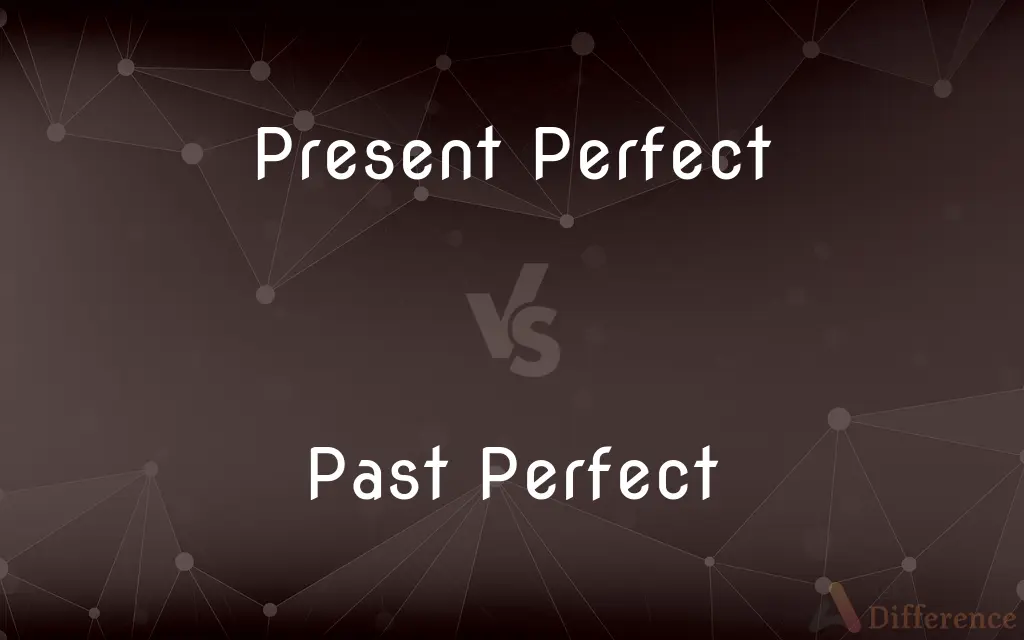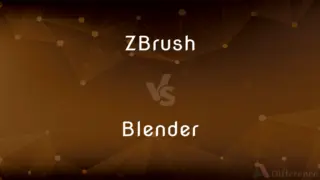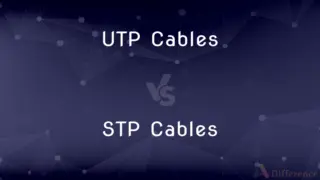Present Perfect vs. Past Perfect — What's the Difference?
By Tayyaba Rehman — Published on January 4, 2024
Present Perfect indicates actions/events occurring at unspecified times leading up to now; Past Perfect indicates actions/events that occurred before other past events.

Difference Between Present Perfect and Past Perfect
Table of Contents
ADVERTISEMENT
Key Differences
Present Perfect and Past Perfect are both aspects of the English verb system, crucial for establishing time relationships. The Present Perfect connects the past and the present. For example, "I have lived in New York." Here, there's an implication that I might still live in New York or that my experience of living there is relevant to the present. On the other hand, the Past Perfect emphasizes an action or event that was completed before another action or event in the past. For instance, "I had lived in Boston before I moved to New York."
Present Perfect and Past Perfect are easily distinguished by their structures. Present Perfect is formed using the auxiliary verb "have" in the present tense, followed by the past participle of the main verb, as in "I have eaten." Past Perfect, however, is formed using the auxiliary verb "had" followed by the past participle of the main verb, like "I had eaten."
When using the Present Perfect, it's crucial to note that it doesn't specify when an action occurred. The emphasis is on the action's relevance to the present. For instance, "They have visited France" means they've been to France at some point in their lives. With the Past Perfect, the focus is on ensuring that the reader or listener understands one past event occurred before another. In "She had already left when he arrived," it's clear her departure preceded his arrival.
Another notable difference between Present Perfect and Past Perfect lies in their uses in storytelling or conversations. Present Perfect often introduces past events or provides background information, as in news reports. For instance, "Scientists have discovered a new species." In contrast, Past Perfect is usually found in narratives to provide backstory or explain the sequence of events, like "By the time she realized her mistake, the opportunity had passed."
Comparison Chart
Structure
Has/have + past participle
Had + past participle
ADVERTISEMENT
Time reference
Unspecified times up to now
Before another past event
Typical use
Linking past action to present
Describing sequence of past events
Example
"I have traveled to Spain."
"I had traveled to Italy before going to Spain."
Time word association
Often with 'since', 'already', 'yet'
Often with 'before', 'after', 'by the time'
Compare with Definitions
Present Perfect
Present Perfect is used for actions that started in the past and continue to the present.
They have known each other for years.
Past Perfect
Past Perfect portrays hypothetical situations in the past.
If I had known about the party, I would have come.
Present Perfect
Present Perfect denotes life experiences.
She has been to a Broadway show.
Past Perfect
Past Perfect shows conditions that were true till another past time.
He had never seen the ocean until he visited California.
Present Perfect
Present Perfect describes actions completed recently.
I have just finished my meal.
Past Perfect
Past Perfect denotes actions completed before another past action.
She had left when I arrived.
Present Perfect
Present Perfect expresses actions that happened at unspecified times before now.
I have visited Paris.
Past Perfect
Past Perfect emphasizes the sequence of past events.
After she had learned to drive, she bought a car.
Present Perfect
Present Perfect indicates changes over time.
The climate has become warmer.
Past Perfect
Past Perfect is used in reported speech to backshift a present perfect statement.
He said he had finished his homework.
Common Curiosities
How is the Past Perfect formed?
The Past Perfect is formed using "had" followed by the past participle of the main verb.
Is "I have went" correct in Present Perfect?
No, it should be "I have gone." Present Perfect requires the past participle form.
When should I use Past Perfect in a sentence?
Use the Past Perfect to show that one past event occurred before another past event.
What's a common mistake with Past Perfect?
A common mistake is using it without a clear reference to another past event. Past Perfect is relational.
Do all English verbs have a past participle form for Present Perfect?
Yes, every verb has a past participle form, but irregular verbs don't follow a standard pattern.
What is the Present Perfect used for?
The Present Perfect is used to describe actions that happened at unspecified times before now or that have relevance to the present.
Is "After I had eaten, I left" more accurate than "After I ate, I left"?
Both are grammatically correct, but the latter is more commonly used and sounds more natural.
Can Present Perfect be used to describe a specific past time?
No, Present Perfect doesn't specify when an action occurred; it emphasizes its relevance to now.
Why is it called "Past Perfect"?
Because it refers to an action that was "perfectly" completed before another past event.
Can Present Perfect be used with specific time references?
Generally, no. But time expressions like "recently," "lately," or "just" can be used.
What is the difference in meaning between "I didn't eat" and "I hadn't eaten"?
"I didn't eat" means I didn't eat at a specific past time. "I hadn't eaten" implies I didn't eat before another event occurred.
Can Present Perfect be used in future contexts?
No, Present Perfect connects past actions/events with the present, not the future.
Do British and American English use the Present Perfect and Past Perfect differently?
While the fundamental rules remain the same, British English tends to use Present Perfect more frequently in situations where American English might use Simple Past.
Are there situations where both Present Perfect and Past Perfect can be used?
Yes, depending on the focus. "I've finished when he called" (focus on now) vs. "I had finished when he called" (sequence of past events).
Why might someone use Present Perfect instead of Simple Past?
To emphasize the relevance or connection of a past action to the present moment.
Share Your Discovery

Previous Comparison
ZBrush vs. Blender
Next Comparison
UTP Cables vs. STP CablesAuthor Spotlight
Written by
Tayyaba RehmanTayyaba Rehman is a distinguished writer, currently serving as a primary contributor to askdifference.com. As a researcher in semantics and etymology, Tayyaba's passion for the complexity of languages and their distinctions has found a perfect home on the platform. Tayyaba delves into the intricacies of language, distinguishing between commonly confused words and phrases, thereby providing clarity for readers worldwide.
















































